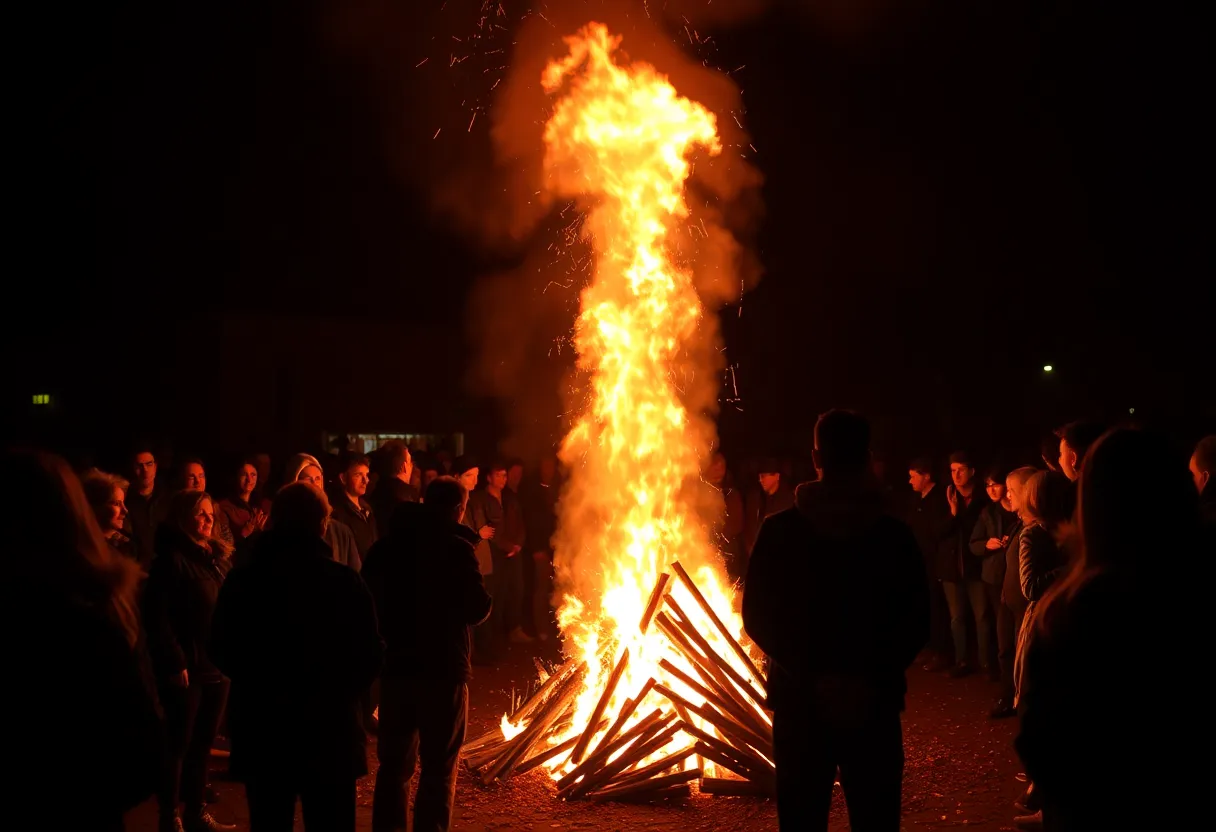News Summary
The Eleventh Night bonfires in Northern Ireland have stirred controversy due to accusations of hate crimes and the discovery of asbestos. The local council has decided to impose sanctions on community groups violating safety protocols, amid calls for stricter regulations in light of recent flag burning incidents deemed hate crimes. The Northern Ireland Fire and Rescue Service faced numerous challenges, responding to hundreds of emergency calls. As the tension rises, community leaders are navigating the delicate balance between cultural celebration and public safety, aiming for improvements in future events.
Controversy Erupts Over Eleventh Night Bonfires in Northern Ireland
The annual Eleventh Night bonfires in Northern Ireland have sparked a tempest of controversy this year following the accusation of hate crimes, the discovery of asbestos, and debates over community funding. The incidents underline the continuing tensions surrounding the bonfire celebrations, particularly in the lead-up to the Orange Order parades held on July 12, which commemorate the historic Battle of the Boyne.
Sanctions Imposed Amid Safety Concerns
The Antrim and Newtownabbey Council has taken a firm stance by agreeing to impose sanctions on community groups that violate the bonfire management program. As part of the program, participants are advised against displaying racist or sectarian imagery. However, this year’s events have left council members unsettled, particularly after asbestos was discovered at the Neillsbrook bonfire site. This hazardous material necessitated urgent removal to ensure public safety, pushing the council to propose a substantial funding reduction of at least 20% or £700 for Neillsbrook’s participation in future bonfire events.
Flag Burning as Hate Crimes
Increased Security Measures
Following the reported flag burnings, Sinn Fein councillor Annie O’Lone has voiced the need for stricter regulations as well as the introduction of penalties for sites involved in flag burning. Her proposals received support from fellow party members, indicating a shift towards a more rigorous approach to managing community events. In contrast, DUP councillor Paul Dunlop has openly opposed these sanctions, calling for a review of the management program.
Strained Resources and Firefighting Challenges
This year’s bonfires proved to be exceptionally demanding for the Northern Ireland Fire and Rescue Service (NIFRS), which received an overwhelming 277 emergency calls and attended to approximately 72 bonfire-related incidents. While many bonfires were lit without incident, some firefighters faced aggression, with one being targeted by a thrown bottle. This incident underlines growing concerns about the safety of not only participants but also emergency responders.
Environmental Risks and Public Safety
Complex issues surrounding public health and safety were further highlighted by Northern Ireland Environment Minister Andrew Muir, who expressed disappointment over bonfires being lit near hazardous materials such as asbestos and electricity infrastructure. Community members continue to voice concerns about safety measures and the environmental impact of these celebrations, especially with more than 23 sites participating under a budget of £171,000 for bonfire-related events.
Towards a Safer Future
In response to these controversies, the bonfire management program aims to improve safety, inclusivity, and reduce environmental impact in future years. Community groups are reminded that they have a limited timeframe of three days to rectify any breaches of the program’s terms, or they risk facing funding reductions. This emphasis on accountability and community responsibility is essential to ensure the sustainability of these traditional celebrations while addressing the pressing issues of hate crimes and health risks associated with asbestos.
The road ahead for the Eleventh Night bonfires is lined with challenges, making it clear that dialogue and enforcement will be key to navigating the delicate balance between cultural expression and public safety.
Deeper Dive: News & Info About This Topic
HERE Resources
Former Welder Files Lawsuit After Lung Cancer Diagnosis Tied to Asbestos Exposure
The Ongoing Battle Against Asbestos: Mesothelioma Awareness
Family Seeks Answers After Father’s Death from Mesothelioma
The Hidden Dangers of Asbestos in Central Asia: A Growing Public Health Concern
Controversial Eleventh Night Bonfire Ignites Amid Health Warnings
Health Concerns Surround Eleventh Night Bonfires in Northern Ireland
The Asbestos Bonfire Dilemma: Tensions Rise in South Belfast
Heightened Tensions as Asbestos Threat Looms Over Belfast Bonfire Site
Legal Proceedings May Arise Over South Belfast Bonfire Risks
Urgent Call for Asbestos Removal in South Belfast



















